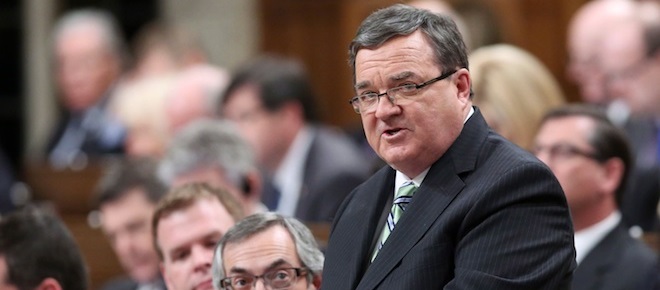Essential reading: your morning five
Canadian parliament talks policy while Indian parliament dodges pepper spray
Finance Minister Jim Flaherty speaks during a TV interview after tabling the budget on Parliament Hill in Ottawa on Tuesday, Feb. 11, 2014. THE CANADIAN PRESS/Justin Tang
Share

While you slept, we considered parliament’s apparent ability to talk policy, an expanded anti-gay agenda in Russia, lawful spying by Canadian authorities, pepper spray in India’s parliament, and a volcanic eruption on the other side of the world.
1. Parliamentarians can talk about real policy. The political world is split: Did Finance Minister Jim Flaherty go rogue when he questioned income splitting, or are he and the Prime Minister on the same page? Whatever the political cost, and whatever the merits of the unsteady Conservative pledge to implement income splitting as soon as the government achieves a balanced budget, parliamentarians should be happy for the debate. Legislators in the House of Commons have a propensity to talk about policy only as a last resort. Senate expense scandals score more political points for the opposition benches. Conversely, government platitudes about job creation paint a happier picture than complex economic plans. This week, anyone who read a newspaper received an education in how income splitting would play out for Canadian families. Three cheers for a meaty discussion about tax fairness.
2. Vladimir Putin is not intimidated by international pressure. Russia’s administration is oh so offended by international attempts to thwart his anti-gay agenda—even during Putin’s treasured Olympics, my god! Prime Minister Dmitry Medvedev signed a new law that would make it illegal not only for gay couples in gay-friendly countries to adopt Russian kids, but also single folks in the same list of scary countries where same-sex marriage is legal. That’s bad news for the thousands of Russian orphans who could really use a loving home. This morning, a Globe and Mail editorial calls out the law for punishing kids: “The Russian government is turning its most vulnerable children into collateral damage in its war on gay rights.” Meanwhile, on go Putin’s Olympics.
3. Canadian spies weren’t spying on Canadian travellers, apparently. Earlier this year, the CBC reported extraordinary claims that Communications Security Establishment Canada was tracking Canadian wireless activity at a major airport—using the WiFi network to better understand wireless habits of those under the microscope. The opposition made hay of the issue in the Commons. Yesterday, CSEC’s watchdog—Jean-Pierre Plouffe, a Quebec judge—dismissed the allegations. “We concluded that this CSEC activity does not involve ‘mass surveillance’ or tracking of Canadians or persons in Canada,” Plouffe reported, matter of factly. That’s one way to silence an opposition attack—until that is, Glenn Greenwald unearths more revelations hidden in leaked U.S. intelligence documents.
4. India’s parliament filled with pepper spray. Canada’s parliamentarians are, from time to time, embarrassing. Usually, they keep their cool. Remember when Government House Leader Peter Van Loan rushed over to Nathan Cullen, his NDP counterpart, and the two had an almost confrontation on the floor of the House of Commons? That incident stands out for its relative rarity. Civil, they are not, but almost always disagreements are limited to verbal abuse. Not so in New Delhi, where an Indian parliamentarian, L Rajagopal of the governing Congress Party, expressed his opposition to the creation of a new state—Telangana—by pepper spraying his colleagues. Rajagopal was booted from the chamber and suspended. Don’t get any ideas, Ottawa.
5. A volcano erupted on the island of Java. Five centimetres of ash coat airport runways. One hundred thousand people are evacuating their homes. Mount Kelud spewed ash over a distance of at least 130 kilometres. And, yet, only about half of the 200,000 residents told to evacuate did so. That’s because volcanic eruptions, dangerous though they may be, are business as usual. “Many in Indonesia are quite used to volcanic eruptions, and are reluctant to leave their homes and belongings,” reported the BBC. Not that Canada’s winter hasn’t been more punishing than usual, but these Indonesians are a hardy people.